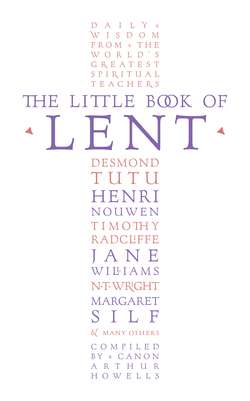Читать книгу The Little Book of Lent: Daily Reflections from the World’s Greatest Spiritual Writers - Arthur Howells - Страница 18
ОглавлениеFRIDAY, WEEK ONE
For Reflection
Heather Ward is a teacher of English and the author of Gift of Self and Giving Yourself Away. She also lectures on prayer and spirituality.
The Wilderness Experience
As Christians I think we perhaps need to accept that we are always on a route to God which may pass through the desert: we dare not live on starvation rations. By this I mean that we need to be feeding continually on truth, on doctrine, so that we are not living solely according to our feelings, our choices, our way of understanding the gospel.
For some of us this may involve concentrating our attention on the basic truths about God as Creator, Father, Redeemer, Lover, especially emphasizing, perhaps, those which we find most difficult emotionally. The need is to allow God to be greater than our powerful feelings. For me, at stages in my life when psychological and emotional difficulties have been uppermost, this has been a matter of directing reading, thinking and praying, towards this one aspect of God in an openness of mind and heart which consents, as it were, to its truth. When we have such difficulties we can often find that beneath it is a powerful resistance to the idea: we don’t like God as Creator, because we don’t like the implications of being a creature; we can’t accept God as ‘Father’ because we take a dim view of fathers.
During one period of darkness, for example, I discovered that God’s ‘absence’ resulted from an unwillingness to let God love me, to let God be Love. I couldn’t cope with a gift I hadn’t earned because it was humiliating, belittling. For me the message behind being loved was about my worthlessness, my incapacity to give anything of value. To be loved unconditionally was for me, to be deprived of any human dignity. Once I realized this I realized that there was also a gap between my mind and my feelings. Intellectually I saw that this idea was wrong-headed and distorted, while emotionally I still ‘knew’ it was true. No amount of argument or persuasion had any power in this situation: it was my feelings which needed re-educating. So I immersed myself as far as possible in brooding upon God as Love – in Scripture, in accounts of Christian experience, in my own life – in a willingness to surrender my own view of love. And in prayer I could only ask him to teach me his meaning of love and offer him a willingness to learn afresh. Certainly I have found again and again that our only way through this kind of impasse is to foster within us some readiness, however faltering, to surrender to God our often cherished and distorted ideas and images, by meditating on his truth in a way which says, ‘Lord, I want to believe this, I want to know it with my whole being. I don’t want to be stuck in myself and my reactions. Teach me what it means.’
